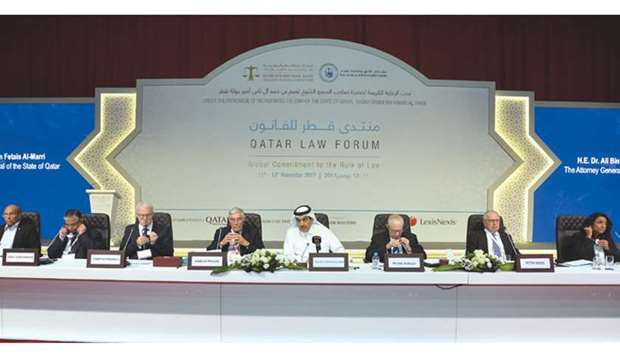Qatar Law Forum 2017 began yesterday with a panel discussion on anti-corruption led by HE Dr Ali bin Fetais al-Marri, Attorney-General of Qatar and president of the Board of Trustees of the Rule of Law and Anti-Corruption Centre (ROLACC), and Lord Phillips, president of the Qatar International Court and Dispute Resolution Centre (QICDRC).
The objective of the Qatar Law Forum is to foster a global commitment to the rule of law, and the international nature of the anti-corruption debate was reflected in the diversity of nations represented on the panel, including Michael Mukasey, former attorney-general of the US, Dr Mohamed al-Marzouqi, former president of Tunisia, and senior leaders in law from India, the Seychelles and the UK.
The theme of the Qatar Law Forum 2017 is Goal 16 of the United Nations Sustainable Development Goals: Peace, Justice and Strong Institutions, with Lord Phillips opening the session stating former UN Secretary General Kofi Annan’s words on how corruption undermines the rule of law, leads to a violation of human rights and allows organised crime, terrorism and other threats to human security to flourish.
Lord Philips made the distinction between petty corruption and grand corruption that involves payments to public officials to obtain lucrative government contracts, and how petty corruption cannot be stopped without first bringing an end to grand corruption.
The speakers examined how grand corruption can be tackled in practice from both the perspective of preventing companies paying large bribes to public officials and also measures to prevent public officials receiving them.
Combating corruption is a wide-ranging process and the high-calibre panel touched on a number of anti-corruption measures including criminalisation of corruption, effective prosecution, enforcement, proving unexplained wealth for government officials and recovery of assets obtained by corruption.
The audience also heard how Qatar has the highest political will for combating corruption in society, and that a long-term holistic approach is needed to tackle this complex issue that includes education as well as a legal framework and enforcement.
An inspirational personal perspective on the rule of law from Dana Khalid al-Anzy of Georgetown University Qatar and Education Above All’s Youth Advocacy Programme began the second panel discussion of the day, examining requirements from the rule of law when people are displaced.
The audience heard about the inherent bias against displaced people and refugees, how the influx of refugees to the European Union have tested some member states’ commitment to rules protecting displaced persons, and the challenges of documenting and protecting Afghan refugees in Pakistan and nationals who have been internally displaced by earthquakes, flood and drought.
Fahad al-Sulaiti, CEO of Education Above All, highlighted the organisation’s efforts to protect children’s education among refugee groups and displaced peoples.
The Qatar Law Forum, organised by ROLACC and QICDRC, continues today with a keynote address by HE Dr al-Marri followed by a panel discussion on access to justice and financial inclusion.

HE Dr Ali bin Fetais al-Marri and other speakers at the discussion yesterday. PICTURE: Noushad Thekkayil
